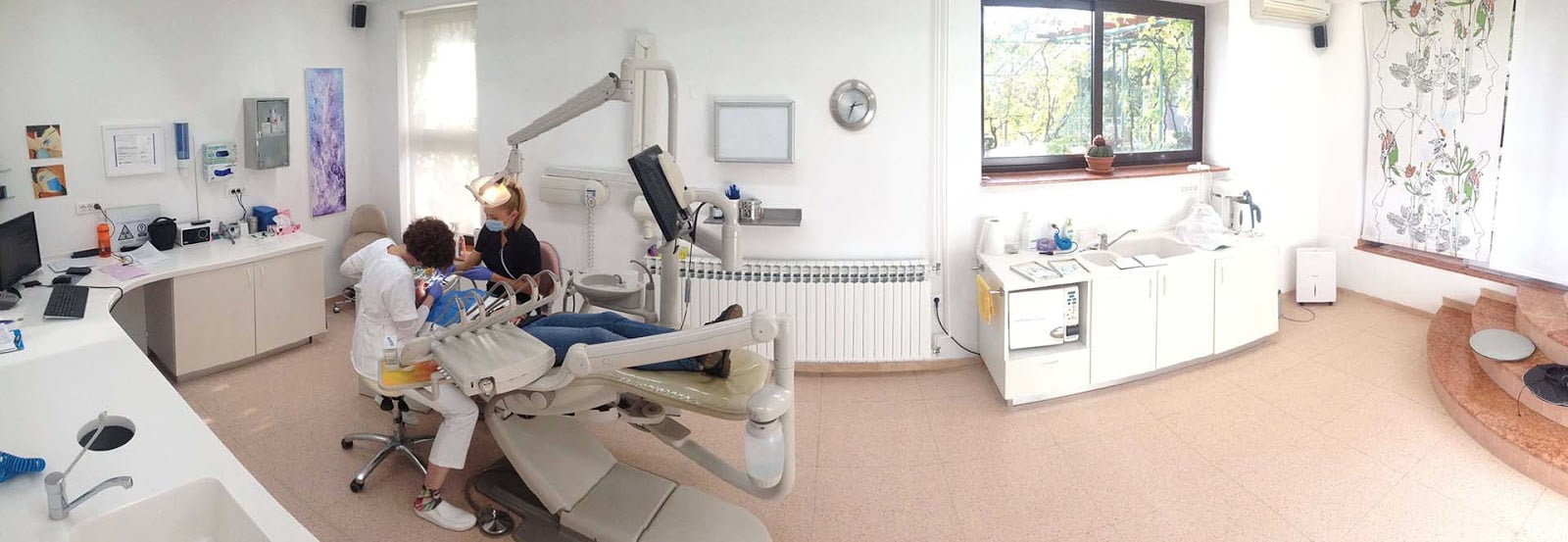Prosthetics is a branch of dentistry that deals with designing and making prostheses while respecting functionality and aesthetics. Of great importance is a quality dental laboratory, which works closely with the dentist.
Fixed prosthetics
Fixed prosthetic works are permanently cemented works that the patient can not remove and replace lost or functionally and/or aesthetically inadequate teeth. The most common works are crowns and bridges, veneers and inlays, onlays, overlays.
The metal-ceramics crowns and bridges, where metal bases are completely covered with ceramics, are the most commonly used dental work and satisfy both functionality and aesthetics.
Metal-free ceramics is produced, just as the name suggests, without a metal base, giving you greater ability to obtain a natural tooth appearance and extremely high aesthetics. Today, modern aesthetic dentistry can not be imagined without metal-free ceramics.
Zirconium oxide is a relatively newer material that, due to its excellent aesthetic and functional characteristics, becomes increasingly common choice material.
Ceramic oxide ceramics
Zircon is a relatively new material in dental medicine and is certainly the greatest discovery of ceramic metal crowns. As a material, Zircon is biocompatible and doesn’t cause an allergic reaction to the surrounding tissue, it is a weak heat and electricity promoter, therefore, the tooth sensitivity is reduced to a minimum. It is an unfavorable base for plaque accumulation, which greatly facilitates the oral hygiene and slows the recession of the gingiva.
Along with all the above-mentioned advantages, zircon is a sufficiently solid material to withstand the molar forces of the lateral region without fracturing. Its aesthetic characteristics are exceptional and give the technician the ability to create a crown that is difficult to distinguish from the natural tooth.
Metal-free ceramic (Press)
It is used exclusively in the frontal region to achieve high aesthetics of the crown or for a minimally invasive veneer technique. Since there is no basis that gives firmness and resilience, it is not suitable for lateral regions due to strong chewing forces.
Metal-ceramic
With the development of dental medicine and dental materials, a complete corrugated crown is eliminated from the use and a metal ceramic crown is introduced. It consists of a metal base (cobalt – chrome – molybdenum, nickel – titanium, gold) upon which ceramic is applied under special laboratory conditions. In this way, the crown takes the appearance of the tooth and satisfies the aesthetic conditions. The strength of metal bases and aesthetics of ceramics allow the use of metal ceramic crowns and bridges in the lateral and frontal regions.
Mobile prosthetics
When fixed prosthetic replacement can not be performed, the situation can be solved by means of a mobile or combined prosthetic replacement. The prostheses are made as mobile dental supplements that can and should be removed from the mouth for proper oral hygiene maintenance.
Mobile prostheses can be complete (total) or partial (partial). Total dentures are made exclusively of acrylates, while partial ones can be made of acrylate (without metal base) or iron (with metal base).
Combined work
Combined work is partially fixed in the mouth, while the wironit prosthesis is a mobile part and it is necessary to remove it from oral hygiene. This combination of fixed and mobile prosthetics is a solid solution when the situation can not be resolved by implantology.
Aditional notes: How to avoid alergic reactions
The continuous increase in the number of chemicals, food additives, and air pollution is a burden for people. Increased use of wireless communications (using mobile phones) creates more powerful high-frequency fields that pose a threat to vulnerable people. So more and more people are looking for compatible and unethical dentures for their personal dental restoration.
The high number of medical materials used in the manufacture of dental prostheses often cause allergy in sensitive persons.
Materials used by Thermopress 400 by injection of plastic resin allow dental technicians to produce prostheses for sensitive persons without the use of chemicals, additives, and catalysts. In this way, dental laboratories are given an option that places them in a very strong position in solving allergies in sensitive subjects.
